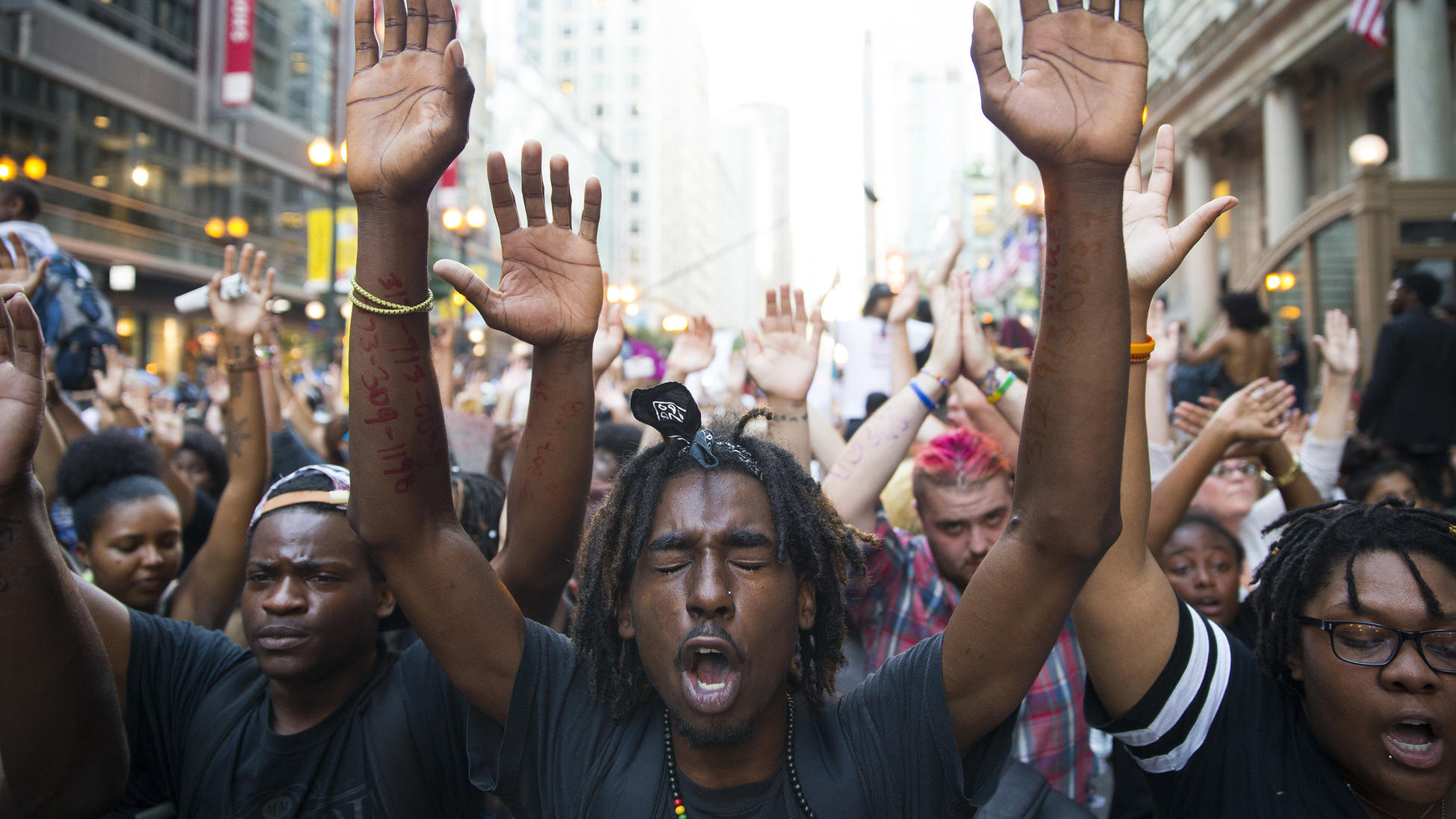
Edward Singleton, center, raises his hands during a rally against police brutality in downtown Chicago.
Photograph by Brandon Chew / Chicago Tribune
How do you pray when you’re Babylon?
Rev. Mindi Welton-Mitchell
September 14, 2018
I sang in the school choir from an early age, and one of the first songs I remember singing was
“How could we sing the Lord’s song in a foreign land?” the psalmist cries out in verse four. We can imagine the pain and the anguish of these words, of losing one’s home, seeing the great city destroyed and being forced to relocate. Even verses eight and nine, which we rarely read in worship, speak to the anger of the injustice visited upon the Hebrew people as they lost everything.
However, now as I sing this song or read this psalm, I struggle because, as an adult, I understand that I live in Babylon. I live in a land where people are pulled over by police and sometimes killed because of their skin color. And I think of Daniel. I live in a land in which people are separated from their families and children caged. And I think of Shadrach, Meshach
How do I read the Psalms or sing the songs, when I live in the land of the oppressor? As a white Christian woman, I do not have to worry about being asked about my citizenship. I do not have the same fear when police pull me over in my car. I do not worry about my child being taken from me. I do not worry about being harassed on my way to worship. I have privilege. And when I ignore it, I become part of the system of oppression.
As a white Christian woman, I do not have to worry about being asked about my citizenship. I do not have the same fear when police pull me over in my car. I do not worry about my child being taken from me. I do not worry about being harassed on my way to worship. I have privilege. And when I ignore it, I become part of the system of oppression.
As the International Day of Prayer for Peace arrives on Sept. 21, I pray for peace in a new way. I pray for peace as part of the oppression—that I will do my part to recognize my privilege and dismantle racism, homophobia, sexism and other forms of systemic violence. I pray that the strength of Daniel would be with me to speak out against police violence and the new Jim Crow of the prison industrial complex. I pray for the courage of Shadrach, Meshach
Today’s Psalm 137:
By the Rio Grande,
There we sat down and there we wept,
For we remembered our home.
Destroyed by gangs and the never-ending war on drugs,
Destroyed by the guns from the School of the Americas,
Destroyed by climate change and for-profit foreign industries.
By the Flint River,
There we sat down and there we wept,
For we remembered a bustling community.
Destroyed by decades of economic injustice,
Destroyed by lead poisoning in our water,
Destroyed by broken promises and forgotten vows.
By the immigration office,
There we sat down and there we wept,
For we came here to be free.
Our hopes destroyed because of the country we are from,
Our dreams denied because of the way we worship.
Our lives shattered because we have no place to go.
I pray for this International Day of Prayer for Peace—that all of us who have white privilege would recognize the systems of violence around us, how we benefit, even indirectly, and that we would work for justice. For we are now Babylon.
The Rev. Mindi Welton-Mitchell is pastor of Queen Anne Baptist Church, Seattle, Wash., and ministry associate of social media for the Evergreen Association of American Baptist Churches USA.
The views expressed are those of the author and not necessarily those of American Baptist Home Mission Societies.
Subscribe to Christian Citizen Weekly

